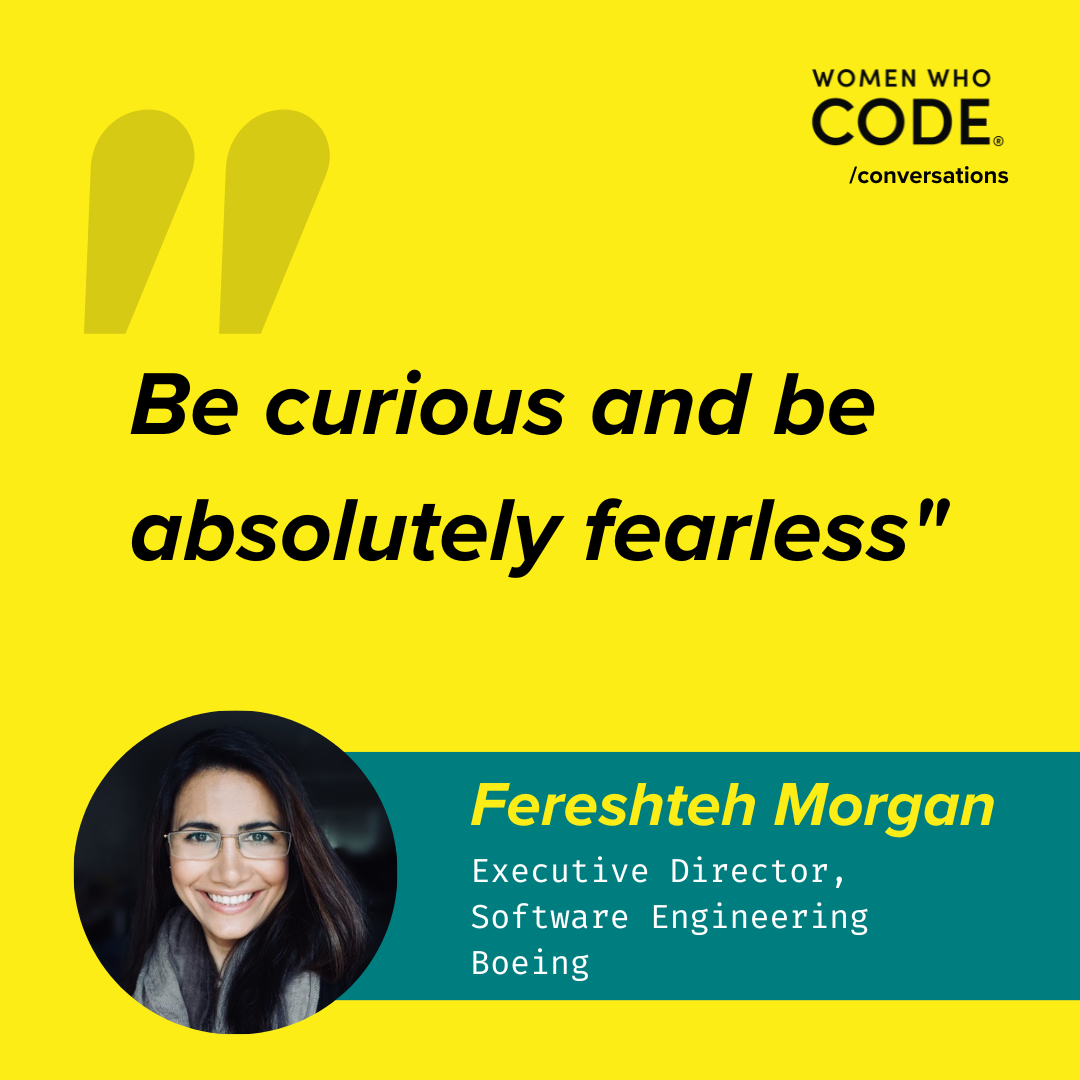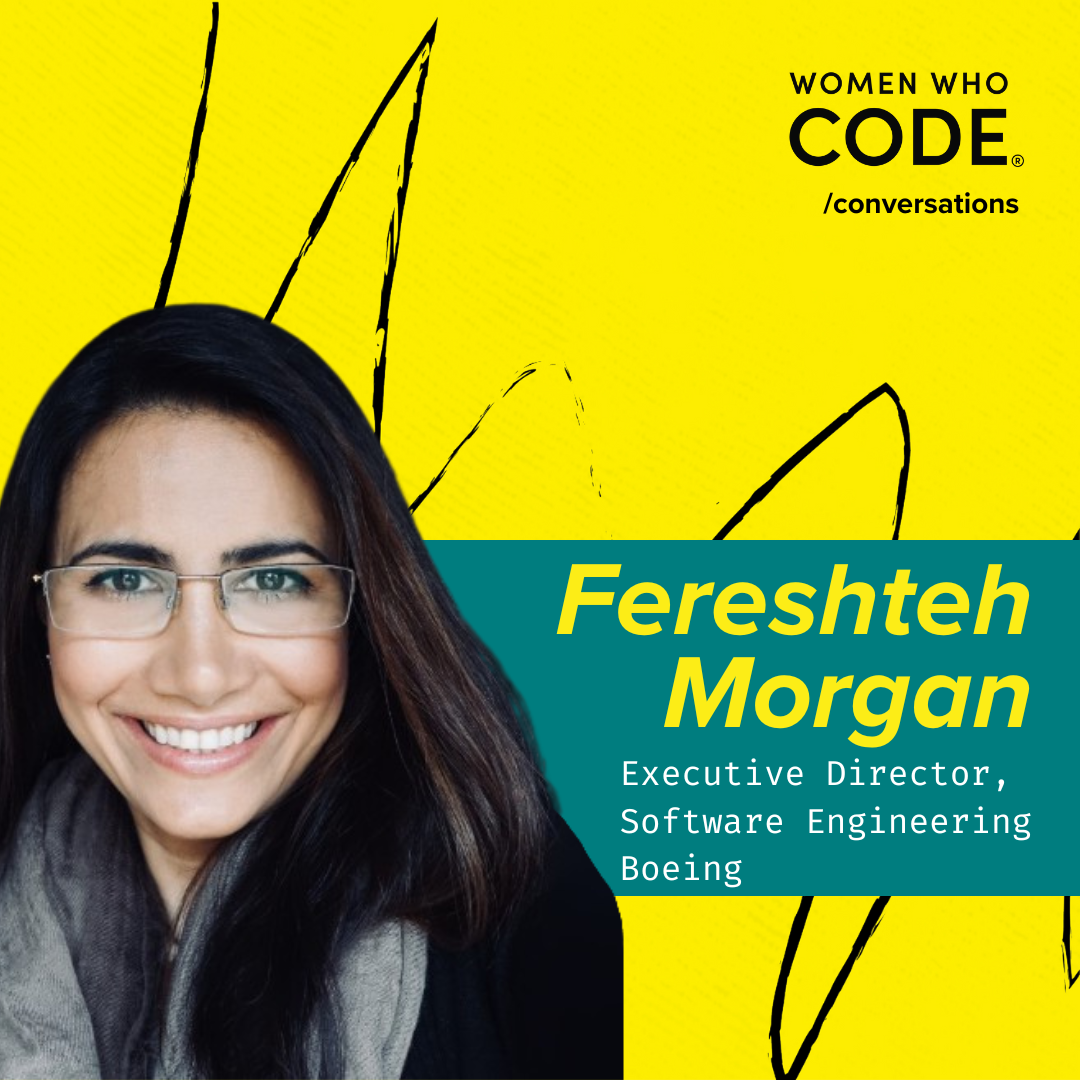Conversations #81: Fereshteh Morgan, Executive Director, Boeing Global Services
Written by Fereshteh Morgan,

Women Who Code Conversations 81 | Spotify – iTunes – Google – YouTube – Text
Luz De Leon, WWCode Leadership Fellow, Front End, sits down with Fereshteh Morgan, Executive Director for Software Engineering, Boeing Global Services. They discuss Fereshteh’s career, her work at Boeing, the things she does to stay motivated, and how diversity can be better incorporated into the industry.
Can you tell me more about your career journey? How did you come to work in technology?
My career journey definitely was not planned. There was no forethought into where I was going. I had equal parts luck and curiosity.
I grew up as a child in the ’80s. My father was an electrical engineer, so he was big into technology. The PC, the personal computer, had really taken off, and we would build those in the house, on the dining table.
So I was building 286s and 386s, and because I had these tiny hands, I would also help my dad feed the memory of their CPUs, and, over time, he just let me do it on my own. I was the fourth grader building computers when nobody else was doing that. It didn’t feel out of the ordinary, it was just something we would do for fun, and I enjoyed putting them together. I never thought I was going to be in computer science. This was just a hobby.
I spent prom night building a 486 computer, so you can say that it’s always been in my DNA. Fast forward to college, and I studied Biochemistry and Physics, as far away from computer science as possible. I had these grand aspirations of becoming a physician.
I was always volunteering in the biochemistry lab to set up the IR spectroscopy computers, and I was writing and running scripts in our biochem labs to match DNA. I started taking computer science classes on the side, so now I had computer science, biochemistry, and physics, and I didn’t have much free time.
And I end up almost taking the whole curriculum for computer science for fun. When I graduated, we were at the top of the dot com bubble, and I had multiple offers from various organizations wanting to hire me for my programming skills.
I worked for a company developing the precursor to Google Earth, writing cancellation algorithms, fusion, and high-speed data transformations. Boeing eventually acquired that company.
You’ve covered the spectrum of software from the seabed to space. Can you describe what that encompasses?
I’ve been incredibly privileged to work at Boeing. I’ve had the privilege of being the software architect for a payload of an autonomous submarine, an 85-foot-long submersible that goes out for months at a time. If you look at the ocean, I’ve been a software engineer and a software architect for ground stations and other similar solutions. If you look up into the sky, I’ve helped route airplanes around volcanic eruptions and other meteorological events. In space, I’ve worked on satellite management software for both commercial and government customers. I can’t think of any place where I would’ve had the opportunity to follow my curiosity and work on interesting platforms but also had a very strong mission to which I felt connected.
Can you talk more about your current role and day-to-day responsibilities?
I am the executive director of software engineering for Boeing Global Services. And in that role, I lead the second-largest software organization at Boeing today. We imagine the process of building and developing aerospace products like the Boeing 777. We think of what goes into that platform’s production and things like the design, the development, and the actual physical production.
If we look at the total lifecycle of that platform, it’s only roughly 30%. So the development, the production of the airplane, is only 30%. The remaining 70% of the total lifecycle resides in Boeing Global Services, BGS. That includes maintenance, modifications, service upgrades, training, and other crew services. My team develops and maintains the software that supports 70% of our platform life cycle.
It’s very mission heavy. The work that we do drives a lot of outcomes for our customers, and it drives a lot of revenue for Boeing as well. We’re lucky to sit in the Venn diagram, the intersection of those two things. My team also supports equipment software that we deploy worldwide and writes flight software for some of our platforms.

Many Women Who Code members are looking to grow into leadership positions and seek advice from senior women like you. What would you say is the best way to lead a team?
I don’t believe there’s one perfect way to lead a team, and I certainly don’t claim that I have the answer for everybody else, but I can share how I found my way and some of the lessons I’ve learned. For me, the best way is to watch the leaders I admire, find the most inspiring ones, and figure out why were they inspiring. I would encourage anyone looking to grow into leadership positions to look around and find those respected leaders, then reflect on the lessons they can learn from them and fold those into their style.
That being said, a couple of key traits have served me well in how I lead teams. The first one is the ability to listen. It’s essential to listen and to listen carefully and actively. People are often busy talking, and no one’s listening to the teams when there’s a lot of good input that comes from teams.If teams feel like you’re listening to them, they’re also more likely to listen to you.
Another trait is being curious and not judgmental. People can see your good intentions if you leave space for other perspectives and come to things with curiosity. That will allow you to bring other ideas in and come up with the best solution for a team. One person rarely has the right answer. You have to leave space for others to bring ideas in.
I also like to ask many questions, and ask the right questions and ask them often. That takes time and practice, but keep asking them and ask the right ones and repeat them over and over. Eventually, people will start coming to you with answers and with solutions. That allows you to incubate all of those ideas into one.
If people think that you are there to support them and to build a team, they’re more likely to want to work and grow with you as part of the team.
It takes practice and you’ll probably get it wrong the first couple of times. But if you have the courage of your convictions and authenticity in what you’re trying to do, it will get easier over time and with practice, and then folks will gravitate towards you, and you will get bigger and larger opportunities to lead teams.
What are the key things that help you to continue to grow in your career?
I’ve always been a little bit fearless and a little bit of a risk-taker and I’ve never let a particular role or activity be defined for me. It comes from the curiosity that I’ve always had. I’ve never had a set plan in my career, it’s always been more about what tickled my fancy. That has organically led me to go from strength to strength and growth to growth.
The other part is that sometimes I’ve gone into areas where I was wrong. If I’d continued in biochemistry just because I had committed to being a biochem major, I wouldn’t be where I am today. I had to admit I was wrong and that it wasn’t the right decision, and let that curiosity lead me to where my next path is. It’s not a formula I can recreate, but it’s worked for me.
Why do you think it is important for the industry to be diverse? And how can the industry improve this?
Diversity of thought, perspective, and economic background is critical on any team, not just in computer science or technology. But it’s even more important in this field. With the proliferation of AI and recommending systems and how those are developed, the people that develop them have biases. Humans have biases. If we don’t have more diversity among the folks developing those platforms, those biases get amplified.
When I was growing up, the media portrayed computer scientists in such a narrow scope. Even when my children were in school, they had a view of what a computer scientist looked like, and it was never me. It was never what I look like. My daughter would say, “Well, I keep telling them that my mom does computer science, and you don’t look like that.”
I think it’s so important that if you can see it, you can be it. If we have more diversity represented front and center, then the people developing those technologies in the future will see themselves in the solutions and apply their own needs to those solutions. If they’re curious, they can apply themselves and build those systems for us in the future.
What are you passionate about outside of work?
I often volunteer at STEM activities at my children’s school. As I said, if you see it, you can be it, so I try to be visible as a role model and pay it forward. I’ve had so much good advice and fortune, and I try to share that in any capacity possible.
I’m also a cyclist, a roadie for those of you who are mountain bikers. I would like to have more time to spend on my bike. But primarily, my biggest passion is my family. I have a 12 and 14-year-old daughter and a son, and I enjoy spending time with them and watching them grow and nurture their curiosity, similar to how my mom and dad nurtured me when I was younger. They often ask me, “Mommy, what will I be when I grow up?” And I say, “I don’t know. No one knows. Just be curious and see where it leads you.”
Do you have a pro tip for women in technology that you want to share with the rest of us?
Have curiosity and be fearless. Don’t worry about being wrong. Don’t worry about making a mistake. Make mistakes fast, learn from them, and move forward. Sometimes we’re defined by external identities that others assign to us, but we don’t have to agree. Embrace your inner you, and don’t be defined by anything external.
***************
Guest: Fereshteh Morgan, Executive Director for Software Engineering, Boeing Global Services
Host: Luz De Leon, WWCode Leadership Fellow, Front End
Producer: JL Lewitin, Senior Producer, Press and Digital Content, Women Who Code
